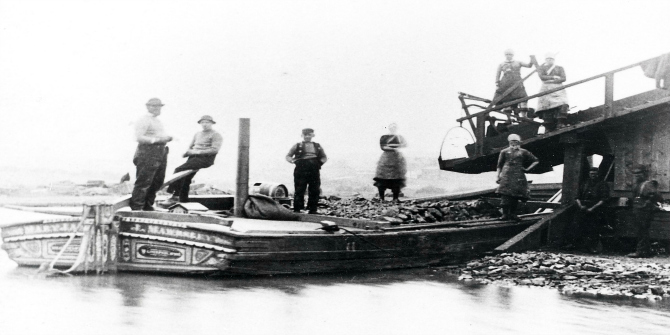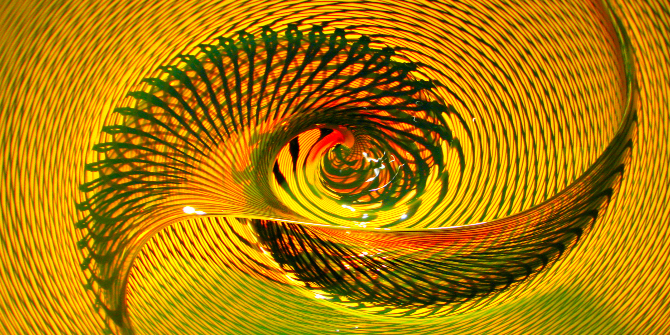 In this feature essay, Helen Butlin reflects on the process of rethinking the notion of ‘workflow’ as a mid-life doctoral mother concurrently working in front-line healthcare. She describes how this has meant apprenticing to writing as a craft, redefining one’s understanding of ‘the good PhD student’ and accepting the inevitable messiness of both life and academic research.
In this feature essay, Helen Butlin reflects on the process of rethinking the notion of ‘workflow’ as a mid-life doctoral mother concurrently working in front-line healthcare. She describes how this has meant apprenticing to writing as a craft, redefining one’s understanding of ‘the good PhD student’ and accepting the inevitable messiness of both life and academic research.
This essay originally appeared on LSE Review of Books and is part of a series examining the material cultures of academic research, reading and writing. If you would like to contribute to the series, please contact the Managing Editor of LSE Review of Books at lsereviewofbooks@lse.ac.uk
6 Dec 2013 Thought Paper for the Health and Rehabilitation Sciences Seminar
Assignment: For this thought paper, I would like you to consider (and describe) the workflow that you use when writing. Do you write outlines before starting a paper? How do you keep track of where your ideas come from? How do you keep track of information that you have read? And finally, how might you make this more efficient?
‘Flow?’, I ask myself, the self that was still in shock that I had started this thing called a PhD. ‘And efficient? ….Is he kidding?’
I am a 47-year-old mother of two working in front-line healthcare, who was offered the chance to do doctoral research on a ‘Pilot Study’ I had developed in my hospital. The PhD seemed like A Good Idea At The Time. The above assignment was a monthly Thought Reflection Paper for the mandatory first-year course, ‘How to be a Successful Graduate Student’. This came just before the end of my first academic term, which was an initiation by fire on the glories and diversity of Qualitative Research (QR). Having neither conducted any formal research nor ever once considered myself to be a Researcher, it was nothing short of revelatory.
The assignment was a timely question, having just handed in my first academic essay in fifteen years. It offered a chance to reflect on this experience. However, ‘flow’ was definitely not the first word that came to mind, while ‘work’ was an excellent description.
The fact is, the ‘workflow’ that ensued in writing the essay was a profoundly disheartening process of realising I am no longer twenty-something. It was a case of trying to remember what my workflow used to be, back in the days of my pre-children brain and all-the-time-in-the-world schedule. I had to figure out whether any of that former process worked after fifteen years of child-induced sleep deprivation while working mostly full-time.
 Image Credit: (inspireexpressmiami)
Image Credit: (inspireexpressmiami)
I had the demoralising realisation that an entirely new workflow was going to have to be designed for this ‘new normal’, which included confronting barriers unimagined in the years before – interruptions galore involving snacks, homework and ‘Mom I have to get to volleyball and no one can take me…’, as well as attempts to import articles with new digital technologies that did not formerly exist. (‘What’s Reference Management Software?’ was my first class question in the ‘How to be a Successful Graduate Student’ seminar. Heads turned … all of them under 30.) Slowly, and painfully, my essay was produced, but ‘flow’ is not a word I’d use to describe the process.
I’m not sure that ‘flow’ exists for any academic over forty. It’s more a process of accepting the limits of life and oneself and getting on with it in fits and starts around the demands of a busy household, worklife, relationships, research projects, writing projects, committees, weddings, births and funerals; of somehow still getting the creative process sparked whilst knowing that perfection belongs to the gods and definitely not to mere mortals and most definitely not to those humbled on a daily basis by our children.
It is realising that one’s thought flow now has no periods in it. So many thoughts jostle in one’s mind and compete for attention. They can ranging from the ridiculous – ‘I might be a poststructuralist with a dash of the postmodern tendency to never fully take hold of any standpoint, but with a critical social theorist adamancy that there must be a ‘‘real’’ if one is going to aim for change in a really messed up world’ – to the sublime – such as ‘cripes-dear-god-its-6pm-and-I have-nothing-for-the-kids-for-supper-and-THANK-ALL-the-goddesses-that-came-up-with-pizza-delivery’.
Academic writing became a zen practice of remembering to put full stops between my thoughts, pausing to figure out what on earth I was actually trying to think, let alone write, and then re-writing all the run-on sentences into intelligible paragraphs. It also became a blessed reason to tell everyone to go away for long periods of time so I can finally, after all these years, reclaim some semblance of a brain and start thinking again. Years on the front-line of healthcare as a busy allied health practitioner have meant a very difficult realisation that one’s thoughts, creative or otherwise, are far less valuable than how many people we can push through our practices to ward off the effects of the Reduced-Budget-For-Next-Year hovering over our heads.
At mid-life, the academic writing process can also be a lifesaving practice to counter the particular kind of demoralisation that I call ‘healthcare despair’. It can put years of clinicalprhonesis – practice-based wisdom – into existence beyond snatched hallway conversations with colleagues that evaporate the minute we walk away on to our next patient. Academic writing for the front-line clinician can be a form of ‘poetic resistance’ to (re)claim our professional knowledge from dying with us, which truly inspired me to continue with my Health and Rehabilitation Science PhD.
‘Flow’ in academic writing over 40 is not the world of the twenty-something student involving herculean hours in the library finding all those thousand articles to secure the magnificent ‘A’ grade one is so determined to acquire. Flow in academic writing for this mid-life doctoral mother became more like a river attempting to get to the ocean with the path of least resistance so that one has a shred of sanity by the end of the day. ‘Flow’ is the prayer that one finds what one needs in the hour and a half one has before the rugrats get home from school, technology glitches notwithstanding. This may be that original thought that burned long enough to get one to sign up for doctoral studies and that can only come to those seasoned by losses, travails and drudgery to hone one’s own being into something original. Digging out the gem of originality from pages and pages of run-on sentences is the challenge.
‘Flow’ is also the prayer that help comes at the midnight hour for editing the epic borne of fifteen years of pent-up front-line knowledge. After a 3am magical writing surge, the edits can happen, but likely without the magic. In the end, writing is a craft and one must apprentice to this regardless of one’s talent. This means hours of editing, and honing others’ big ideas into half of an original one of one’s own. It’s always a movement from more to less. Just like mothering. Who I thought I’d be as a mother is a ratio of about 100 million to the power of 10 million to the mother I actually am. The doctoral study I thought I’d set out to do has borne out to have the same ratio.
‘Flow’ in my first doctoral course paper involved writing an outline a month before life happened. I had tried very hard to do what I believed all good PhD students should do. I planned the outline mid-term. I read the readings and sources, make good notes, gathered all the bones and expected that I would then write. Unfortunately, my flow means I write as a method of inquiry. I never know what I want to say until I write. Hard as I tried to change this for my first course’s final essay, it was not to be.
My process is therefore counter to notions of ‘the good PhD student’ in my mind’s eye and the one described in all the writing workshops offered by my university. Every single paper I’ve written since has happened in pretty much the same way. I should have been on to this. Trying to be ‘the good mother’ by looking around me at all the high-functioning supermoms in the playground brought me to despair. Being ‘the mother I am’ was a long and painful process towards some semblance of self-acceptance and self-respect. Why I thought it would be any different in a PhD programme, I have no idea. After beating myself up for being a ‘woman of many words’, I sat down on this first essay to the task of editing. ‘Flow’ then meant a wrestling match with a story that seemed to refuse to fit in the box it was destined for: a Qualitative Methodology paper of fifteen pages.
Adding to this natural inability to Write-With-A-Plan, life came along and ‘happened’, upsetting the whole notion anyway. My father was diagnosed with cancer. My creative inner muse refused like a mule to follow any outline. I sat with it in hand, empty-hearted, and started writing something completely different. Since the topic of my essay was an autoethnography of creating a support group in an oncology programme, my father’s diagnosis brought my worklife close to home. It meant the outline evacuated its content in a hollowing-out of everything that had felt important about the paper. My father was dying. The paper didn’t seem to matter. Now a different story was being lived and the story intending to be written evaporated, because ‘flow’ in life means one writes in the real time of the now, not in the future or the past. ‘Flow’ means letting go of what one thinks one should write and surrendering to what heart and soul is actually asking to be written. Sleepless one night, I got up and wrote from the middle, from where I was in that moment. Ten hours later, I hadn’t stopped writing. My first paper was born.
Through a different lens, one could perhaps see that a hugely wise thing had happened with that paper given that, in the coming months, my father would die and I had to interrupt my doctoral studies ‘flow’ to head over to England for palliation and his funeral. ‘Flow’ meant I may have instinctively, through some bone wisdom beyond my ken, have gotten myself ahead, so that I didn’t get too far behind with the vagaries of what had arrived in the present.
Stories have their own life. So does research; it just gets made to look less messy than it really is. Life has never not been messy; we just try to live as if it isn’t and create intellectual worlds that try very hard to smooth out the edges. I could do nothing but surrender to the process and trust it since it clearly had a life of its own, much in the same way that many who have come through my door in the cancer programme have had to learn how to live with the big non-negotiable in their life called ‘mortality’.
‘Flow’ in all this meant that, despite the chaotic appearance of this whole process, I wrote what subsequently became my comprehensive exam paper awarding me the title of PhD Candidate in one year. This has also become the first chapter of my thesis. It turned out I had laid down the major philosophical and theoretical underpinnings for my research. The paper also became a much-edited book chapter (in press) and garnered an invited article in a journal.
So ’flow’ can mean that sometimes while it looks like the river is insanely wasteful, meandering its way to the ocean, it actually uses the least amount of energy of all modes of transport created to get there. The mind might think it has the ‘right’ path mapped out, but the organic wisdom of life, residing in our creative bones, might have a different way, which may just, in fact, be truly one’s own unique way. This may be situated right in the heart of the flow of things and get us there much more easefully and carefully than we ‘think’. And when we stop thinking, sometimes that’s when our most original thoughts might well dare to be born.
Note: This article gives the views of the author, and not the position of the LSE Impact blog, nor of the London School of Economics. Please review our Comments Policy if you have any concerns on posting a comment below.
Helen Butlin is a Registered Psychotherapist in Ontario, Canada, specialising in oncology care at the London Regional Cancer Program, ON, Canada and a private practice focusing on supporting individuals to integrate personal wisdom in leadership, clinical professions and daily life in general. She is also doctoral candidate in Health Professional Education at Western University, Ontario, focusing on excluded knowledges in cancer care from women’s perspectives when living with ovarian cancer. She is a co-author of Just Stay: A Couple’s Last Journey Together (2012) and has a particular interest in qualitative research that integrates poetics and embodiment. More information about Helen’s work can be found atwww.helenbutlin.com.








So good to hear of someone’s experience which chimes with my own. This blog series is really excellent and a refreshing to read.